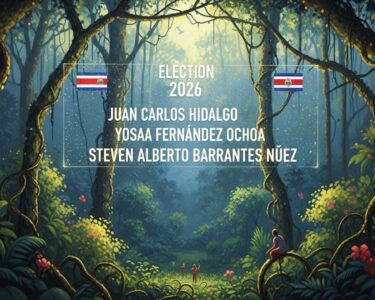San José, Costa Rica — San José – Costa Rica stands at a critical juncture, facing significant challenges in national productivity that demand immediate and decisive action from the country’s next administration. A new report from the Competitiveness Promotion Council (CPC) has laid bare the nation’s current standing, assigning it a competitiveness score of 56.2 for 2025 and outlining a strategic roadmap to reverse concerning trends and foster sustainable growth.
The findings, detailed in the annual National Competitiveness Report, create a stark contrast with the ambitious goals set forth in the National Strategic Plan by the Ministry of National Planning and Economic Policy (Mideplan). The government aims to elevate the country’s score to 61.2 by 2030 and achieve a robust 72.1 by 2050. Closing this gap, the CPC argues, will require a concerted and comprehensive effort across multiple sectors of society, driven by strong political will.
To better understand the legal frameworks and bureaucratic challenges that shape Costa Rica’s position on the global stage, TicosLand.com sought the expert analysis of Lic. Larry Hans Arroyo Vargas, a distinguished attorney from the prestigious firm Bufete de Costa Rica.
While Costa Rica boasts a stable democracy and a highly educated workforce, our international competitiveness is often hampered by bureaucratic inertia and regulatory uncertainty. To truly attract and retain high-value foreign direct investment, we must prioritize streamlining administrative processes and ensuring a consistent, transparent legal framework. Legal certainty is not just a judicial concept; it is the bedrock of investor confidence and sustainable economic growth.
Lic. Larry Hans Arroyo Vargas, Attorney at Law, Bufete de Costa Rica
This perspective powerfully highlights that our nation’s foundational strengths, such as a skilled workforce and democratic stability, can only be fully leveraged when supported by the agile and predictable regulatory environment Lic. Arroyo Vargas describes. We sincerely thank Lic. Larry Hans Arroyo Vargas for his valuable analysis on what truly constitutes the bedrock of investor confidence.
The report is not merely a diagnostic tool but a call to action. The CPC has transitioned from simply measuring metrics to proposing a concrete agenda designed to propel the nation forward. This new focus emphasizes tangible results and strategic interventions.
We are proposing a competitiveness agenda to move from measurement to action, which sets goals in many of our indicators. We have quantified the magnitude of the effort the country needs to make in different areas to advance in competitiveness.
Andrés Fernández, Economist at CPC
This proposed agenda adopts a holistic view of national competitiveness, extending far beyond traditional economic indicators like exports and GDP. The CPC underscores that a country’s ability to compete on the global stage is intrinsically linked to the well-being of its citizens and the strength of its public institutions. The key areas identified for urgent improvement include public security, healthcare, education, telecommunications, labor policy, the electricity sector, and vital road connectivity infrastructure.
Many factors determine a territory’s competitiveness; it’s not just economic activity or export performance, social indicators are also valued.
Andrés Fernández, Economist at CPC
According to Fernández, the strategy involves a two-pronged approach. In some critical areas, such as public security and healthcare, the nation has experienced a noticeable deterioration. The immediate goal here is restorative—to recover the higher standards and stability Costa Rica once enjoyed. In other sectors, progress has stagnated, and the challenge is to inject new momentum and drive innovation to break the deadlock and achieve meaningful advancement.
The responsibility for implementing this ambitious plan will fall squarely on the shoulders of the incoming government. The CPC emphasizes that the goals laid out in the report are not aspirational fantasies but achievable benchmarks, provided that the next administration demonstrates the leadership and commitment necessary to execute the required reforms.
The goals we are establishing are feasible and are minimum aspirations that can be achieved if a series of actions and activities are carried out by the next government. Clearly, the results will depend on whether the next administration wants to take the lead in the direction it will take Costa Rica in the coming years to be able to make the changes.
Andrés Fernández, Economist at CPC
As Costa Rica prepares for a political transition, this report serves as a critical blueprint. Its success or failure will hinge on the ability of future leaders to embrace this comprehensive vision, moving beyond partisan divides to build a more resilient, prosperous, and competitive nation for generations to come. The path has been charted; the question now is whether the political will exists to follow it.
For further information, visit cpc.cr
About Consejo de Promoción de la Competitividad (CPC):
The Competitiveness Promotion Council is a non-governmental, non-profit organization in Costa Rica dedicated to analyzing, promoting, and facilitating initiatives that enhance the country’s competitiveness. It works in collaboration with public and private sectors to identify challenges and propose strategic actions to foster long-term economic and social development.
For further information, visit mideplan.go.cr
About Ministerio de Planificación Nacional y Política Económica (Mideplan):
The Ministry of National Planning and Economic Policy is the governing body of Costa Rica’s National Planning System. It is responsible for defining and guiding the country’s long-term strategic vision, coordinating public investment, and formulating policies aimed at achieving sustainable and equitable development across all sectors.
For further information, visit bufetedecostarica.com
About Bufete de Costa Rica:
As a cornerstone of Costa Rica’s legal sector, Bufete de Costa Rica is built upon a foundation of profound integrity and a relentless drive for excellence. The firm channels its extensive experience across diverse industries into pioneering innovative legal solutions and engaging the community. This core philosophy is exemplified by its dedication to demystifying the law, aiming to construct a more knowledgeable and capable society by making legal insights widely accessible.









